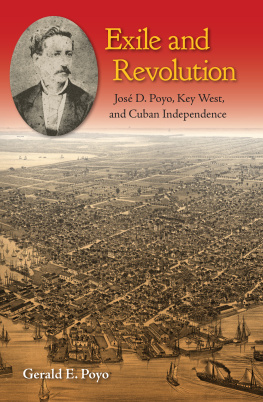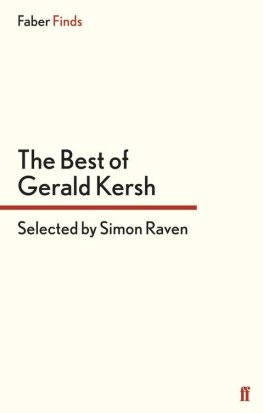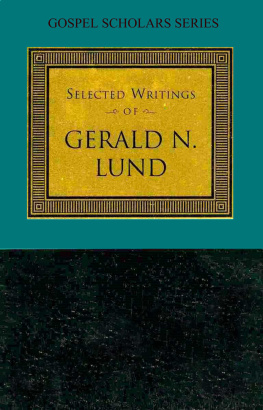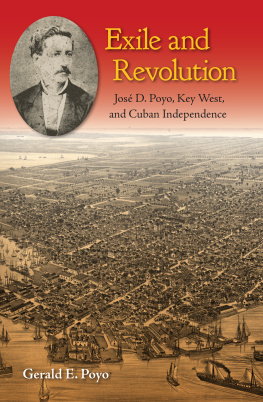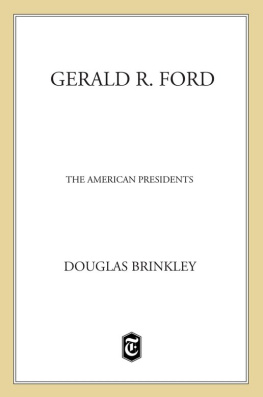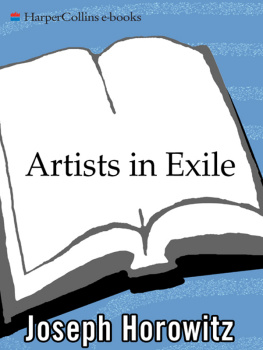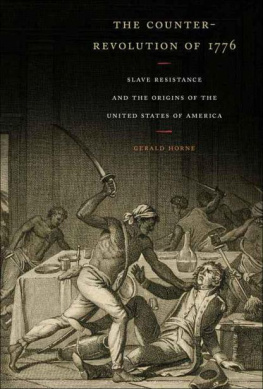Poyo Gerald E. - Exile and Revolution
Here you can read online Poyo Gerald E. - Exile and Revolution full text of the book (entire story) in english for free. Download pdf and epub, get meaning, cover and reviews about this ebook. year: 2019, publisher: University Press of Florida, genre: Politics. Description of the work, (preface) as well as reviews are available. Best literature library LitArk.com created for fans of good reading and offers a wide selection of genres:
Romance novel
Science fiction
Adventure
Detective
Science
History
Home and family
Prose
Art
Politics
Computer
Non-fiction
Religion
Business
Children
Humor
Choose a favorite category and find really read worthwhile books. Enjoy immersion in the world of imagination, feel the emotions of the characters or learn something new for yourself, make an fascinating discovery.
- Book:Exile and Revolution
- Author:
- Publisher:University Press of Florida
- Genre:
- Year:2019
- Rating:5 / 5
- Favourites:Add to favourites
- Your mark:
- 100
- 1
- 2
- 3
- 4
- 5
Exile and Revolution: summary, description and annotation
We offer to read an annotation, description, summary or preface (depends on what the author of the book "Exile and Revolution" wrote himself). If you haven't found the necessary information about the book — write in the comments, we will try to find it.
Exile and Revolution — read online for free the complete book (whole text) full work
Below is the text of the book, divided by pages. System saving the place of the last page read, allows you to conveniently read the book "Exile and Revolution" online for free, without having to search again every time where you left off. Put a bookmark, and you can go to the page where you finished reading at any time.
Font size:
Interval:
Bookmark:

Exile and Revolution

UNIVERSITY PRESS OF FLORIDA
Florida A&M University, Tallahassee
Florida Atlantic University, Boca Raton
Florida Gulf Coast University, Ft. Myers
Florida International University, Miami
Florida State University, Tallahassee
New College of Florida, Sarasota
University of Central Florida, Orlando
University of Florida, Gainesville
University of North Florida, Jacksonville
University of South Florida, Tampa
University of West Florida, Pensacola
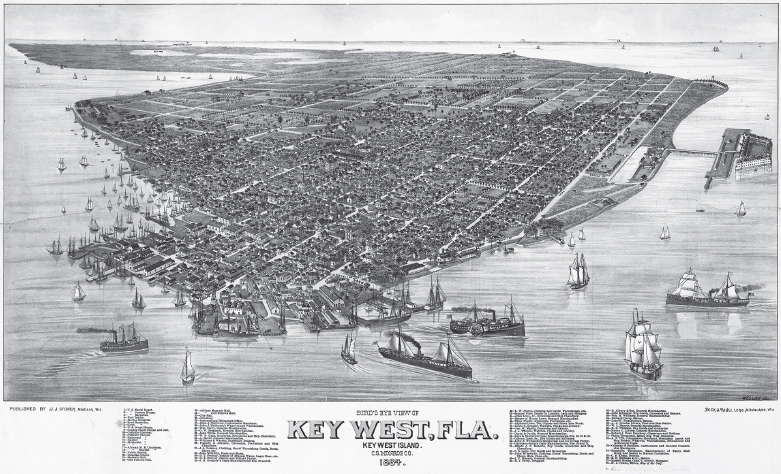
EXILE AND REVOLUTION
Jos D. Poyo, Key West, and Cuban Independence
GERALD E. POYO
University Press of Florida
Gainesville Tallahassee Tampa Boca Raton
Pensacola Orlando Miami Jacksonville Ft. Myers Sarasota
Copyright 2014 by Gerald E. Poyo
All rights reserved
Printed in the United States of America on acid-free paper
Frontispiece: Birds Eye View of Key West, Monroe County, Fla. 1884. J. J. Stoner, 1884.
Lithograph printed in Milwaukee by Beck and Pauli. Source: Library of Congress, Geography and Map Division.
This book may be available in an electronic edition.
First cloth printing, 2014
First paperback printing, 2019
24 23 22 21 20 19 6 5 4 3 2 1
Library of Congress Cataloging-in-Publication Data
Poyo, Gerald Eugene, 1950 author.
Exile and revolution : Jos D. Poyo, Key West, and Cuban independence / Gerald E. Poyo.
pages cm
Includes bibliographical references and index.
ISBN 978-0-8130-4918-2 (cloth)
ISBN 978-0-8130-6426-0 (pbk.)
1. Poyo, Jos D. (Jos Dolores), 18371911. 2. CubaHistory18781895. 3. CubansFloridaKey WestHistory. 4. Key West (Fla.)History. I. Title.
F1783.P77P69 2014
972.9105dc23
2013034531
University Press of Florida 2046 NE Waldo Road Suite 2100 Gainesville, FL 32609 http://upress.ufl.edu |  |
To Noel and Jeremy
CONTENTS
FIGURES
PREFACE
When I was a teenager living in Buenos Aires, my father, who rarely spoke of Cuba, told me that his great-grandfather, Jos Dolores Poyo, collaborated with Jos Mart in promoting Cubas independence war against Spain. Not having grown up in a Cuban community, I knew little about Mart, only that he was a well-known journalist across the Americas, a great modernist poet, and an unceasing political activist who worked for Cuban independence. In 1975, while perusing a volume of Jos Marts Obras Completas (Complete Works) at the Latin American Collection of the University of Florida Library, a letter reminded me of what my father had said. This letter from Mart to Poyo and the many that followed as I turned the pages revealed a close relationship between the two men. Numerous historical references to Poyo pointed to a role that was much more substantive than the published record suggested. This put me on a trail of research that I pursued over the next thirty-five years.
Unfortunately, the vast majority of Poyos personal papers never reached the safety of an institutional archive. No completeor even near-completecollection of his newspaper El Yara, which he published in Key West for twenty years, survived. He left a modest Donativo Jos Dolores Poyo in the Cuban National Archive, but the bulk of his papers were in the possession of his son Francisco, and they disappeared after he passed away in March 1961. His daughter, who was in a rush to leave the revolutionary situation in Cuba soon after her fathers death, left the collection with a friend. In 1982, during an extended research trip to Havana, I set out to find the papers. A visit to Franciscos former home led me to the neighborhood church, where the priest, after some investigation, learned that the person who received the papers had died a decade earlier. The trail ended, but perhaps the documents will reappear one day.
Another unfortunate event was the loss of Poyos correspondence with Jos Mart, which disappeared along with most letters from Martis correspondents. Marts one-way correspondence with Poyo is certainly a treasure, but Poyo himself is silent. On a brighter front, an important collection of letters from Mart to Poyo that Poyo presumably gave to his daughter Amrica, who passed them to her grandson Lus Alpzar Leal, surfaced in 1991 and was published by the Centro de Estudios Martianos in Havana. Even without a major collection of Poyos papers on which to rely, I uncovered enough material to tell his story. My sources include issues of his newspaper El Yara, scattered correspondence with other revolutionary personalities, the memoirs of various historical actors, significant collections of other newspapers published by exiles, Spanish consular records, and some written and oral family sources.
Much of the research for this book was conducted in Cuba in 1982 with funds from a Fulbright-Hays grant and the encouragement and cooperation of scholars at the Centro de Estudios Martianos, Archivo Nacional de Cuba, Biblioteca Nacional Jos Mart, and the Instituto de Literatura y Lingstica, but recent research in Spain provided critical sources that allowed me to complete the project. I am grateful to Consuelo Stebbins, who in 2007 alerted me to a rich collection of consular documents in the archive of the Spanish Ministry of Foreign Relations. Research in Madrid and work in an even richer collection at the Archivo General de Administracin in Alcal de Henares finally made this book possible.
As I prepared to consult archives in Spain, St. Marys Universitys Spain Abroad Program, which is associated with the Franklin Institute at the University of Alcal de Henares, selected me as a participating faculty member for spring 2010. This facilitated four months of research in Spanish archives. I am grateful to the universitys Spain Program; Rev. Rudy Vela and Grace Keyes, its past and present directors; program administrator Minita Santizo; and my colleague Larry Hufford. In many different ways, Larry and his spouse Linda freed me up to spend more time in the archives than I expected, and on many evenings they listened to my descriptions of my archival finds over wine and tapas. The eleven independent and very talented students enrolled in the Spain program made the time in Alcal de Henares easy, enjoyable, and productive for all. A faculty development grant and a sabbatical from St. Marys University helped finance other travel and provided time to write. I thank my colleague Dan Bjork, who read parts of the manuscript and suggested ways to help the story flow.
Producing a book always requires a talented editorial team. At the University Press of Florida, senior acquisitions editor Amy Gorelick and project editor Marthe Walters efficiently moved the project from manuscript to published book. Consuelo E. Stebbins and Anne Fountain, manuscript evaluators for the press, expressed great support for the project and offered excellent recommendations. Meticulous, insightful, and judicious copyediting by Kate Babbitt has helped the book sparkle and shine. I am grateful to them all.
I am thankful for a fifteen-year relationship with Nicols Kanelloss National Hispanic Literary Recovery Project at the University of Houston for constantly encouraging and facilitating research about Latino historical communities and highlighting the value of these kinds of studies. One of my most satisfying investments of time has been my service as a member of the Recovery Projects Board of Directors. The Recovery Projects online digital collection of U.S. Hispanic newspapers facilitated locating numerous obscure articles about my subject.
Next pageFont size:
Interval:
Bookmark:
Similar books «Exile and Revolution»
Look at similar books to Exile and Revolution. We have selected literature similar in name and meaning in the hope of providing readers with more options to find new, interesting, not yet read works.
Discussion, reviews of the book Exile and Revolution and just readers' own opinions. Leave your comments, write what you think about the work, its meaning or the main characters. Specify what exactly you liked and what you didn't like, and why you think so.

